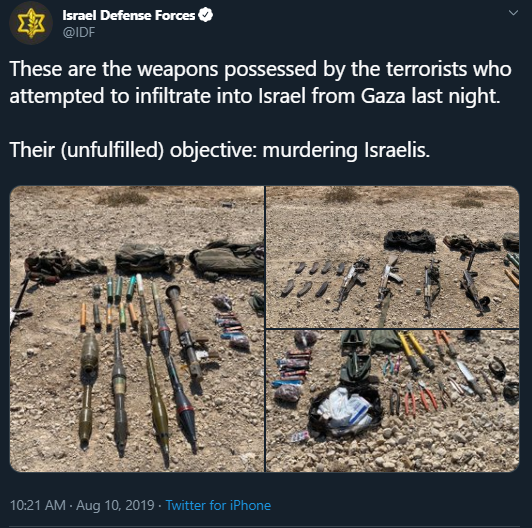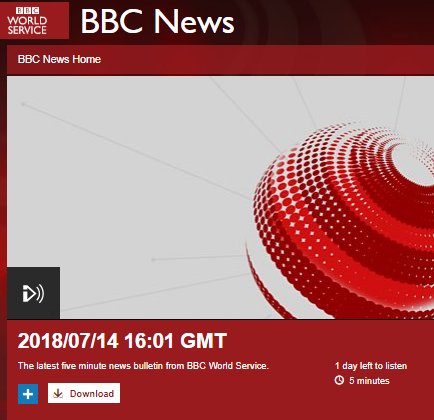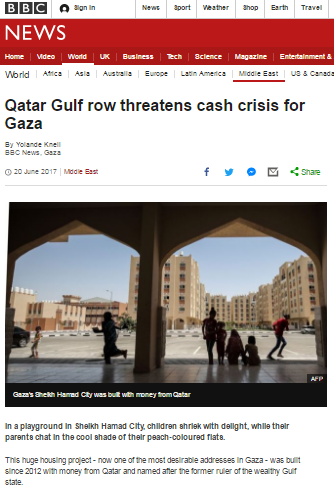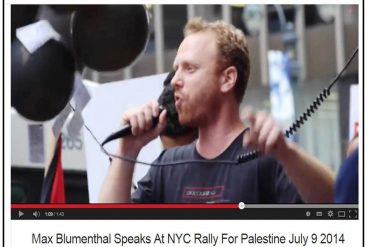The BBC’s extensive Balfour Declaration centenary coverage included two contributions from Jane Corbin: a filmed programme first aired on BBC Two on October 31st under the title “The Balfour Declaration: The Promise to the Holy Land” (available for a limited period of time in the UK here, transcript here) and a written article that appeared on the same day in the ‘features’ section of the BBC News website’s Middle East page under the headline “The Balfour Declaration: My ancestor’s hand in history“.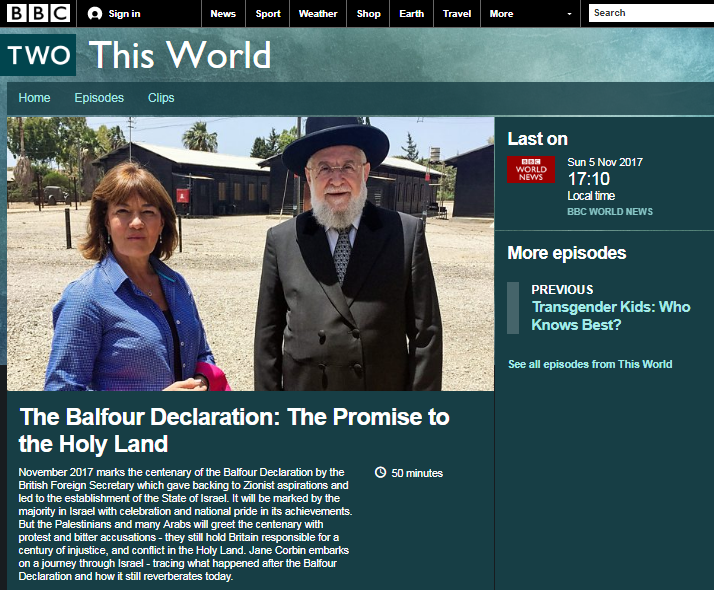
Both of those reports opened with promotion of a theme often seen in BBC content: the exaggerated notion of the Arab-Israeli conflict as the world’s prime dispute.
Filmed: “100 years ago, a British promise – just a few words in a letter – lit a fire in the Holy Land. The Balfour Declaration ignited one of the most bitter and intractable struggles of modern times: the Arab-Israeli conflict.”
Written: “One hundred years ago, only 67 words on a single sheet of paper lit a fire in the Holy Land, igniting the most intractable conflict of modern times.” [emphasis added]
Very early on, both reports also included promotion of Palestinian talking points concerning the Balfour Declaration.
Filmed: (synopsis) “But the Palestinians and many Arabs will greet the centenary with protest and bitter accusations – they still hold Britain responsible for a century of injustice, and conflict in the Holy Land.”
Written: “While many Israelis believe it was the foundation stone of modern Israel and the salvation of the Jews, many Palestinians regard it as a betrayal.”
As has been the case across the board in the BBC’s coverage of the Balfour Declaration centenary, both Corbin’s reports focused audience attentions on one particular part of the text. Coincidentally or not, it is that section of the text that has also been the focus of anti-Israel campaigners’ Balfour related propaganda.
Filmed: “Leo Amery added a sentence. ‘Nothing should be done’ he wrote, ‘which might prejudice the civil and religious rights of existing non-Jewish communities’. The line was intended as a safeguard for the majority population in Palestine – the Arabs. But they would interpret it as anything but.”
Written: “My mother, Olive Amery, told me stories when I was a child about this relative – a British politician involved in the drafting of the declaration. He added a sentence intended to safeguard the civil and religious rights of the majority population, the Palestinian Arabs.”
While Corbin did accurately portray that part of the letter’s text as referring to “civil and religious rights” (rather than ‘rights’ in general, as seen in much other BBC content), nowhere in either of her reports were BBC audiences told of the part of that same sentence likewise intended to safeguard “the rights and political status enjoyed by Jews in any other country”.
In her filmed report Corbin revisited a previous interviewee.
Filmed: Corbin: “Most Palestinians have certainly failed to reap the benefits of Israel’s success. Their living standards are far lower. There’s a crisis in their economy and public finances. It all stems, many Palestinians believe, from the unfair hand that Britain dealt them 100 years ago. I first met Jawad Siyam, a Palestinian activist, seven years ago, protesting against the takeover by some Israelis of a building in an Arab area of Jerusalem. For Jawad, his battle over the land today is a continuation of the struggles of his grandparents.”
Corbin did indeed meet Siyam in 2010 when he appeared in her highly problematic Panorama programme “A Walk in the Park” in which audiences heard him claim that:
“They are demolishing the houses because they want to. It’s ethnic cleansing for Silwan, for east Jerusalem. … It’s the most racist state in the world, you see. See this state? It’s the most racist state in the world. [To Israeli police:] You are the most racist people in the world!”
Since then Siyam has been featured in BBC content on at least two additional occasions but in this latest film by Corbin , beyond the tepid description “activist”, nothing was done to inform audiences of the nature of his political activities and his agenda – as required by BBC Editorial guidelines on impartiality.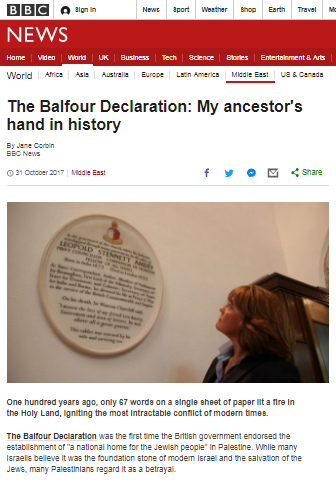
In both reports Corbin visited Lifta.
Filmed: “In the violence, and after attacks by Jewish forces, hundreds of thousands of Palestinians, whose homes lay within the new state of Israel, fled or were forced to flee. The village of Lifta, on the outskirts of Jerusalem, was abandoned. Lifta has lain empty for nearly 70 years. Palestinians have never been allowed to return to live here. But, every year they come back with their children and grandchildren to remember.
Written: “One of the most poignant moments for me was visiting the ruins of Lifta – a Palestinian village abandoned nearly 70 years ago – with some of the old residents.
Many Palestinians from here became refugees and have never been allowed to return to live in Lifta. But every year they come back with their children and grandchildren to remember.
Hamid Suhail was seven when he fled – now he leans on a stick as his son Nasir helps him down the overgrown rocky slopes.
“I hope the day will come when we will have the right to come back here and live in peace,” says Nasir. Hamid’s granddaughter, Sohar, is emotional as she says: “It makes me angry and sad at the same time to come here – although it is important to remember the history of these houses.””
Unsurprisingly, Corbin’s account did not make any mention of the violence against Jews perpetrated by residents of Lifta on countless occasions throughout the decades before Israel came into being. Neither were audiences told that in early December 1947, the residents of Lifta received orders from the Arab Higher Committee to evacuate the village’s women and children to Ramallah and that the village was made into a base for the Najada militia, from which attacks were launched on Jewish neighbourhoods on Jerusalem’s western side such as Kiryat Moshe, Givat Shaul and Romema.
Discussion of Corbin’s reports will continue in part two of this post.
Related Articles:
Jane Corbin’s BBC documentary on plight of ME Christians promotes jaded Israel-related narratives
One to watch: BBC’s Panorama on ‘The War of the Tunnels’

